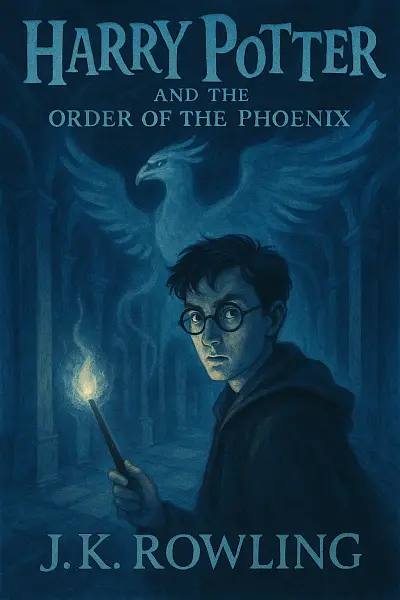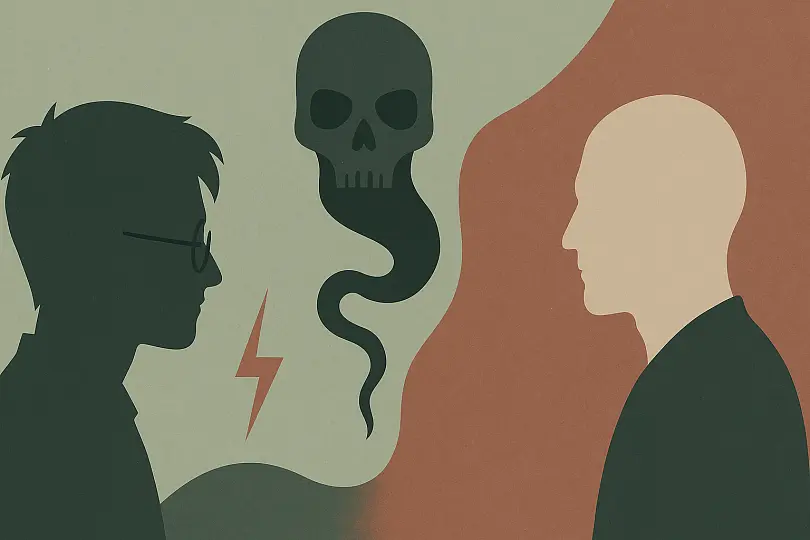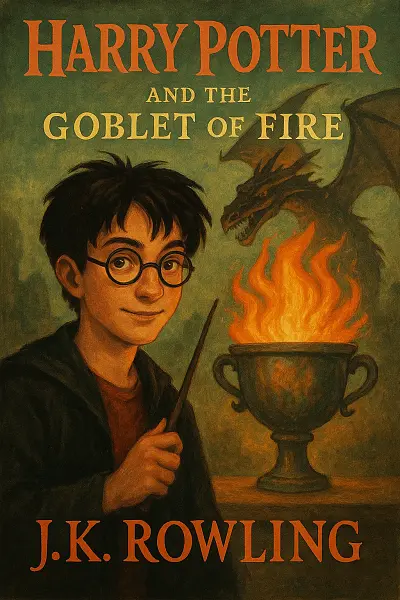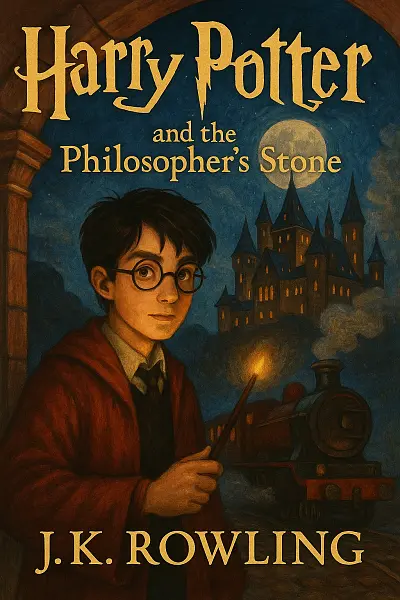
Harry Potter and the Order of the Phoenix
by: J.K. Rowling
Harry Potter is stuck with the Dursleys while darkness rises in the Wizarding World and the Ministry refuses to acknowledge the truth. When Harry is attacked by Dementors in the Muggle world, he’s pushed into a whirlwind of suspicion, secrecy, and tension at Hogwarts, where the dreadful Dolores Umbridge enforces stricter rules than ever. The Order of the Phoenix fights Voldemort in secret, but Harry feels isolated and frustrated as adults keep him in the dark.
Haunted by visions from Voldemort, Harry and his friends must decide whether to follow the rules—or rise up, risking everything they hold dear. Will they dare to fight back?
""True courage is standing for what’s right, even when your voice trembles and the world refuses to listen.""
Let's Break This Down
The Author's Voice
Atmosphere
- Immersive and charged, the vibe is noticeably darker and more urgent than previous entries.
- Expect a mood that swings between magical wonder and simmering tension, fueled by political paranoia at Hogwarts and the wider wizarding world.
- Everyday school details still burst with charm, but there’s a heavier undercurrent threaded through nearly every page—loss, mistrust, a nagging sense of injustice.
Prose Style
- Rowling’s writing leans conversational, brisk, and readable, peppered with sharp dialogue and that unmistakable British wit.
- You’ll find longer chapters and more introspective passages; Harry’s emotional turbulence is front and center, often coloring the narrative with raw, sometimes prickly honesty.
- Descriptions remain vivid, especially when conjuring magical scenes or capturing the stifling dread around Dolores Umbridge.
Pacing
- The story unfolds deliberately, with a big cast and multiple subplots—some moments linger, especially early on, as the tension builds.
- Expect bursts of heart-pounding action punctuating slower stretches of classroom drama, internal conflict, and bureaucratic battles.
- The sense of foreboding gradually amplifies toward a frantic, high-stakes climax.
Character Development
- Emotions run high: Harry’s turmoil is palpable, often leading to outbursts and strained friendships. His growth feels messy but real.
- Supporting characters—Hermione, Ron, the Weasleys, new faces like Luna and Umbridge—get meaningful screen time, layering the story with fresh perspectives and moral ambiguity.
- Motivations are murkier this time, making even familiar faces feel more complex and unpredictable.
Dialogue & Voice
- The banter remains clever and quick, but exchanges also bite deeper, laced with anger and frustration.
- Rowling nails teenage voices, capturing the highs and lows of adolescence in both humor and heartbreak.
Overall Vibe
- Expect a moodier, more mature adventure. Magic dazzles, but the emotional and thematic stakes have seriously risen. This is Harry Potter at his most raw, sullen, and relatable—perfect for readers ready to grapple with the darkness and hope swirling beneath the surface.
Key Moments
-
Umbridge’s reign of pink terror—detentions, decrees, and a quill that cuts to the bone
-
Dumbledore’s Army: secret midnight meetings, forbidden magic, and teen rebellion in the Room of Requirement
-
Sirius Black’s heart-wrenching fate—family found and lost all over again
-
All-caps Harry—raging angst, loyalty, and raw grief fuel every explosive outburst
-
Prophecy revealed! Destiny, choice, and the chilling weight of expectation collide
-
Gritty Ministry of Magic battle—DA vs. Death Eaters in a whirlwind of shattered glass and high stakes
-
Dolores Umbridge: the villain you love to hate—saccharine smile, iron fist, and pure bureaucratic evil
Plot Summary
Harry Potter and the Order of the Phoenix kicks off with Harry’s struggle at the Dursleys and the shocking attack by Dementors in Little Whinging. After a nerve-wracking hearing at the Ministry (thanks to Dumbledore’s quiet intervention), Harry returns to Hogwarts where Dolores Umbridge, sent by the Ministry, exerts authoritarian control that stifles the school. Harry, frustrated by the adults’ inaction, forms “Dumbledore’s Army” to secretly train students in Defense Against the Dark Arts. The climax hits at the Department of Mysteries, where Harry and friends battle Death Eaters — ultimately resulting in Sirius Black’s tragic death and Voldemort’s public return. The school year ends with a mix of grief and resolve, as Harry realizes the full weight of the prophecy tying him to Voldemort.
Character Analysis
Harry Potter is angrier and more isolated than ever, grappling with trauma, a lack of agency, and the burden of prophecy. Over the course of the book, he shifts from impulsiveness and isolation toward greater resilience and an understanding of the costs of leadership. Hermione Granger shows new levels of cunning and moral courage, quietly orchestrating the DA and standing up to Umbridge. Ron Weasley battles with his insecurities, slowly growing into his own person as a capable friend and teammate. Dolores Umbridge stands out as a chilling, bureaucratic villain, driven by a blend of personal sadism and political loyalty, representing a more insidious evil than even Voldemort. Meanwhile, Sirius Black, Harry's father figure, demonstrates deep flaws—recklessness and longing for the past—contributing to his tragic downfall.
Major Themes
One major theme is the abuse of power and authority, vividly exemplified by Umbridge’s reign—and the Ministry’s denial of Voldemort’s return. Students find solidarity through resistance and rebellion, notably with Dumbledore’s Army as a symbol of youthful activism. Rowling also explores the burden of trauma; Harry’s anger stems from grief and anxiety, and the book doesn’t shy from showing the psychological aftermath of violence and loss. Finally, the theme of truth versus propaganda runs throughout, as characters grapple with lies, censorship, and the dangers of accepted narratives.
Literary Techniques & Style
Rowling adopts a darker, more complex tone, with longer chapters and expanded perspectives reflecting the chaos and opacity of the wizarding world. She uses symbolism expertly—the Room of Requirement stands for hidden potential and the necessity of adaptation; Umbridge’s quill and punishments are literalizations of bureaucratic cruelty. Dialogue is snappier, with internal monologues revealing Harry’s alienation. There’s a notable use of metaphors, especially around Harry’s connection to Voldemort, where dreams and visions blur the boundaries between hero and villain.
Historical/Cultural Context
Set in the late 1990s, the book subtly parallels contemporary anxieties about government overreach, media manipulation, and civil rights. Rowling wrote during a time when questions about institutional trust and whistleblowing were making headlines, which is mirrored in the Ministry’s crackdown on dissent and control over information. The school setting also reflects classic British boarding school traditions, upended by the political emergency.
Critical Significance & Impact
Order of the Phoenix is often seen as the series’ emotional turning point, praised for its psychological depth and refusal to pull punches about loss and adversity. Critics lauded Rowling’s willingness to let her characters make mistakes and face real consequences, setting a new bar for YA complexity. Its enduring popularity comes from its fearless look at pain, rebellion, and resilience—making it a touchstone not just for Potter fans, but for anyone navigating uncertainty and adult responsibility.

Rebellion ignites at Hogwarts as darkness rises and loyalties are tested.
What Readers Are Saying
Right for You If
Who Will Absolutely Love This Book
If you’re already deep into the Harry Potter world and can’t get enough of Hogwarts, magic, and clever twists, Order of the Phoenix is basically a must-read. Seriously, grab it now. This book is perfect for anyone who:
- Adores coming-of-age stories: There’s so much teen angst, emotional drama, and those “nobody understands me” moments—especially if you love watching characters grow and mess up but become stronger for it.
- Can’t resist fantasy with a darker edge: The stakes are higher, the villains are scarier (hello, Umbridge!), and the wizarding world just gets more complex.
- Lives for ensemble casts: If you love books with a crew of quirky, lovable side characters (Luna! Neville!), you’ll be in bookish heaven.
- Needs a little rebellion: There’s some serious fighting-the-system energy here. If you get fired up by stories about resisting corrupt authorities, this is your Harry Potter installment.
- Likes chunky books: You know who you are—the people who see a 700-page book and get excited instead of intimidated.
Who Might Want to Skip It
Honestly, not everybody is going to vibe with this one, and that’s totally okay. You might want to give this one a pass if:
- You’re not into slower-paced reads: There’s a lot of emotional build-up, internal struggles, and, let’s be real, some lengthy sections at the Ministry that drag on.
- You hate moody protagonists: Harry’s dealing with a TON, but if you can’t stand angsty or “whiny” leads, his attitude here might grate on you.
- You like your fantasy light and breezy: This book gets dark—there’s loss, cruelty, and real moral dilemmas. Not the best fit if you want pure escapism or nonstop fun.
- You haven’t read the first four books: Seriously, start at the beginning. Jumping in here will be confusing and spoil all the awesome twists that came before.
So, if any of that sounds like your kind of magic, you’ll have a blast. But if you’re allergic to angst, intense school politics, or brick-sized tomes, maybe pass Harry the Marauder’s Map and find something a little lighter!
What You're Getting Into
Ready to dive deeper into the wizarding world?
Harry Potter returns to Hogwarts for his fifth year, only to find the magical community in denial about the threat looming over them—and a mysterious new authority figure determined to make school life miserable. With friendships tested and the weight of responsibility growing heavier, Harry and his friends must unite as secrets, suspicion, and resistance simmer just beneath the surface. Dark, urgent, and fiercely emotional, this chapter cranks up the stakes, throwing you right into the heart of the battle between truth and power.
Characters You'll Meet
-
Harry Potter: The resolute protagonist grappling with trauma and isolation, Harry’s leadership skills emerge as he forms Dumbledore’s Army and defies authority at Hogwarts.
-
Hermione Granger: The ever-resourceful and logical friend who spearheads the creation of Dumbledore’s Army, Hermione’s unwavering commitment to justice and truth is crucial throughout the struggle.
-
Ron Weasley: Loyal and fiercely supportive, Ron stands by Harry even as the pressures mount, showcasing both his insecurities and growing maturity within the group dynamic.
-
Dolores Umbridge: The sadistically bureaucratic Defense Against the Dark Arts teacher whose oppressive regime at Hogwarts provides the main source of conflict, pushing students toward rebellion.
-
Sirius Black: Harry’s godfather and emotional anchor, Sirius’s yearning for action and connection ultimately propels some of the book’s most heartbreaking moments.
More Like This
If Percy Jackson and the Olympians: The Titan’s Curse hit that sweet spot for you with its blend of adolescent angst, high-stakes magical battles, and friends-at-your-side camaraderie, Order of the Phoenix will resonate just as strongly. Both series tap into that delicious tension between everyday school headaches and the looming weight of world-altering prophecies, with an added layer of humor and heart.
Reminiscent of The Hunger Games: Catching Fire, Rowling’s fifth Potter installment takes the rebellious spark and ignites it into a full-on resistance—think government oppression, secret training sessions, and an almost palpable tension pulsing through each page. The sense of injustice Harry faces at Hogwarts will immediately stir memories of Katniss’s struggle with the Capitol, highlighting how even the most reluctant heroes are called to fight back.
And if you’re a fan of Buffy the Vampire Slayer, you’ll definitely find yourself right at home here. The wounded, snarky, world-weary humor, the focus on a close-knit group of friends battling literal and metaphoric demons, and the way both Harry and Buffy grapple with the crushing expectations of destiny—they’re cut from the same cloth. There’s even a taste of that addictive blend of supernatural school drama and coming-of-age chaos that made Buffy so binge-worthy.
Critic's Corner
What happens when the adults meant to shield us grow just as fearful as those who threaten us? In Order of the Phoenix, J.K. Rowling plunges deep into this uncomfortable question, forcing both her protagonist and her readers to grapple with the distortions of truth, the pain of isolation, and the fraught transition from innocence to agency. The magic here isn’t just in spells—it’s in how deftly Rowling explores the cracks in authority and the cost of resistance.
Rowling’s writing takes on fresh urgency and darkness in this installment, her narrative voice sharpening to match the mounting tension. Scenes crackle with dialogue that rings true to adolescent anxieties and petty cruelties, especially through the scathing presence of Dolores Umbridge. Rowling’s ability to layer humor amidst dread remains unparalleled; moments in the Room of Requirement or Weasley twin hijinks provide much-needed levity without undermining stakes. She experiments with perspective, using Harry’s increasingly unreliable narration and psychic connections to Voldemort, blurring boundaries between self and other. The prose is denser than previous volumes, sometimes unwieldy, but undeniably immersive—she captures both the oppressive atmosphere and the scrappy hope that animates the student resistance. Yet, the thickening plot occasionally meanders, with long stretches at the Ministry and in Hogwarts feeling repetitive. Rowling sacrifices some pace for psychological depth, which will either delight or frustrate, depending on your patience.
At its core, this is a story about power: who wields it, who cowers before it, and who outgrows their fear of it. Rowling interrogates the bureaucratic rot of authoritarianism through Umbridge’s rise, making her perhaps the series’ most terrifying villain precisely because she weaponizes rules and order against meaningful rebellion. The book aches with adolescent anger—Harry’s raw, often alienating pain—and with the consequences when institutions refuse to listen. Friendship and solidarity become radical acts, and the beloved cast is forced to consider what it means to dissent, to shoulder trauma, and to grow up in a compromised world. The emotional complexity—grief, suspicion, courage—feels both authentic and urgently timely, evoking real-world parallels in how societies handle inconvenient truths. Questions about memory, propaganda, and the price of speaking out resonate long after the final page, making this a surprisingly mature meditation on coming of age under threat.
Within fantasy literature, Rowling’s fifth outing stands apart for its uncompromising emotional honesty. Unlike the escapist fantasy typical to many contemporary series, Order of the Phoenix embraces uncertainty and dread, trusting readers not only to handle darkness but to find hope within it. Compared to earlier Harry Potter books, this is a bolder, more intricate, and at times more divisive novel. It expands the universe while deepening its psychological texture, recalling the moral ambiguity of Ursula K. Le Guin or Philip Pullman, while maintaining Rowling’s distinct blend of wit and warmth.
Not everything lands: meandering subplots and repetition drag the pace, Harry’s anger can exhaust, and the sheer length will deter some readers. But at its best, Order of the Phoenix is Rowling at her bravest—a vital, uncomfortable, necessary fantasy that both challenges and empowers. For those ready to face the shadows, it’s utterly essential.
Community Thoughts
Umbridge. That woman still creeps me out. I had nightmares about her pink office and those horrible kitten plates. Never thought a teacher could be scarier than Voldemort, but here we are.
Wasn’t ready for how Umbridge would haunt my dreams, honestly. She’s worse than any Dementor, and every pink cardigan scene made me want to throw the book out the window. Rowling nailed villainy here.
Umbridge made my blood boil. That sugary smile hid pure evil, and I COULDN'T STOP READING because I needed to see her get what she deserved. The pink, the kittens, the detentions... honestly, nightmare fuel.
Umbridge. Seriously, she haunts me. That fake sweet voice, the pink overload, the CREEPY kittens. I think I was more terrified of her than Voldemort. How did Rowling make a teacher scarier than a dark wizard?
there’s this part where sirius calls harry “James” and it just SHATTERED ME. why did rowling have to go and twist the knife like that? i keep thinking about it at 2am. absolutely brutal.
Leave Your Review
Local Take
Why It Matters
Harry Potter and the Order of the Phoenix really strikes a chord in the US, tapping into some deep-rooted American vibes:
- Defiance against authority—The student rebellion against Umbridge totally echoes the spirit of the American Revolution and later youth-led protest movements. Challenging unjust systems? Feels super familiar here.
- The tension between individual rights vs. government overreach in the book mirrors debates around surveillance, censorship, and freedom—big American concerns, especially post-9/11.
- Americans love an underdog story, and Harry’s struggle against a corrupt institution lands hard, matching cultural admiration for standing up and speaking out.
If you’re used to rugged individualism and anti-authoritarian heroes in US lit—from Huck Finn to dystopian YA—Order of the Phoenix fits right in, but cranks up the emotional angst and highlights the costs of resistance.
Some readers may find the Ministry’s denial of hard truths especially relevant, given recent polarized politics. The frustration and hope feel very "now," making it hit differently!
Food for Thought
Controversies:
-
Harry Potter and the Order of the Phoenix has faced criticism from some religious groups who argue the book promotes witchcraft and the occult, fueling a broader debate over its suitability for children in certain schools and libraries.
-
There has also been discussion around the portrayal of authority figures, with some readers and critics debating whether the series’ depiction of government corruption (especially through characters like Dolores Umbridge) is too dark or allegorical for its young readership.
Like what you see? Share it with other readers







